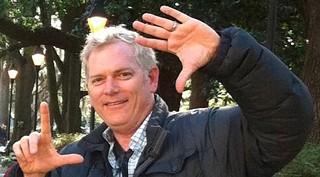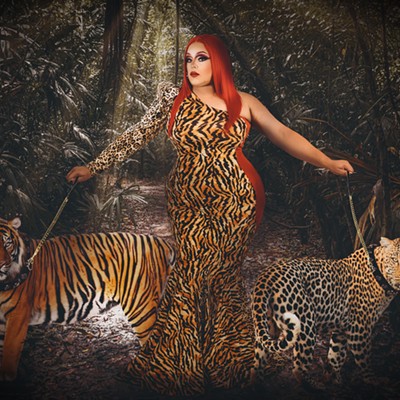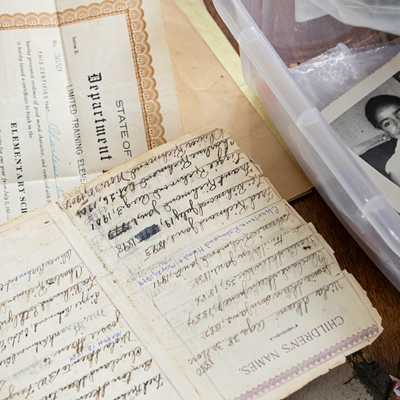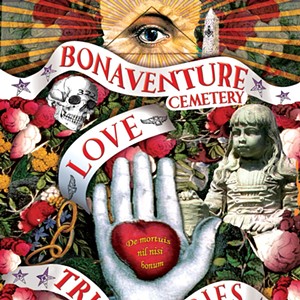Randall Miller has a three-paneled photo stored in his phone. On the left is a profile shot of Hilly Kristal, the late owner and operator of legendary New York punk club CBGB. In the center, a similar profile of British actor Alan Rickman.
The final frame shows Rickman, sporting Kristal's mop of curly hair and unruly grey beard.
The resemblance is uncanny. Miller can't help but smile every time he looks at it.
In a few days, production will begin at Meddin Studios on CBGB, the film written and produced by the California-based Miller and his wife Jody Savin.
CBGB, which Miller will direct, is not only the talk of Savannah, it's buzzing like a Texas chainsaw in the movie and music industries.
Rickman heads a cast that includes his Harry Potter co-star Rupert Grint, Malin Akerman from Rock of Ages, Ashley Greene from Twilight, TV stars Stana Katic (Castle) and Johnny Galecki (The Big Bang Theory) and Foo Fighters drummer Taylor Hawkins.
Miller took a few minutes to talk with us about the project that he, Savin and their co-producer Brad Rosenberger (a longtime fixture in the music publishing business) have been losing sleep over for many months.
Where did the idea for the film come from?
Randall Miller: Jody and I got to know Brad over the years because invariably, on an independent movie, you don't have the finances to pay for music. And the only way you can get music is to become friends with the publishers. So we became pretty good friends with Brad. On our movie Bottle Shock, we had like 17 cuts of Doobie Brothers and Foghat, all this great old stuff.
We always ask people, "What's a great story you'd want to tell, if you could tell a story?" And Brad told us the story of Dennis Wilson, the drummer from the Beach Boys. We thought it was great and said maybe we can do something with this ... but what we'd like to do, Brad, is we'd like you to be our partner on it. And furthermore, we'd like for you to leave Warner-Chappell, and get into the lucrative and non-moneymaking business of doing independent films!
He had to convince his wife, but he's like us, we're middle-aged and we're sort of doing things because we love ‘em. That's basically our life. He decided, since the music business has been taking all the turns it's taken lately, it was time for a change. And so he joined us.
We were sitting there working on The Drummer. And I'm always spinning for more ideas, and I was saying "Maybe we need to do another music kind of thing, that also has some connection to Warner Brothers, that you're familiar with. But maybe on the East Coast. What could it be?"
I always loved CBGB. And I thought, rather than do another bio-pic, per se, let's do one about a scene. About a moment in time. And that's how we arrived upon CBGB.
Is this when Lisa Kristal, Hilly's daughter, got involved as a co-producer?
Randall Miller: It was very tough because Lisa and the family and CBGB had financial difficulties, so there were all these different people claiming they had the rights, and bankruptcy, and stuff like that. And it took us a while to figure it out, that it was Lisa that had the rights. We made a deal with Lisa.
As we were putting our movie together, it turned out that these other guys in New York came in, and they made a bigger deal to buy the rights to CBGB. We already had our rights, so it worked out great because they've now become involved with us. Because they see this as a great thing for them as well. They're planning a music festival in New York, and eventually, there might be a club.
So that didn't preclude you from doing your thing ...
Randall Miller: Not at all. In fact, it made it even better because they're helping us, in the fact that they have all these artifacts of the club that they sent. So that brings the memory back, and it helps them because they're trying to get this music festival going.
So the artifacts from the actual club have arrived from New York? How does it all look?
Randall Miller: It's good stuff! We got the bar, we got the phone booth - the phone booth is a character in the movie because there's lots of stories that happen in the phone booth. His desk, where you pull out the drawer and there are the numbers of all the people who were there, all their details ... I opened up one of the drawers, and there was a local deli menu, with his matzo ball soup circled. On the back of one of the playbills in his desk was the lineup for the night that he had written out.
So ... everybody's talking about the CBGB toilets.
Randall Miller: Yeah, they're here.
Why was that important? Just trying to build as much atmosphere as you could?
Randall Miller: The funny thing is, all the books will say "It was an amazing scene ... and the toilets were so disgusting!" Everybody says it, from Joey Ramone's book, Cheetah Chrome says it. Everybody. So it seemed kind of ... right to do that.
There was an exhibit a couple years ago where they made the bathroom of CBGB, and it traveled around the country. So it felt like, if we're gonna do this, we have to have at least a couple scenes in the bathroom.
You're assembling quite a cast.
Randall Miller: The cast has just gone phenomenally well. Everybody's working for scale and all that, so you never really know what's going to happen - but I think once Alan signed on, and Malin Akerman signed on, then it became kind of a cool thing. And as cool things go, other people signed on ...
What about the music? Will it be live vocals, or pre-recorded with the actors, or lip-synching?
Randall Miller: There's going to be a little of each. For the most part, we're finding live recordings that were either recorded there, or were recorded other places that sounded like that. We're going to use those, and then at the beginning of the song we'll blend the real actor in. And then it'll become the real recording.
It's not like a Ray Charles movie - "oh, it's the actor singing" - it's more about the scene. So it's more about the authenticity of the music, and the way the set looks, and how the people are.
How pivotal of a role does the music play in the film? Is it more of an actor-y thing, or are there set pieces like "Now, here's Television doing a song!"
Randall Miller: It's part of the tapestry. It's not the set piece. Because if you do that, you're doing Rock of Ages or something. It's not that. It's not like where people stop and sing ... it's like, they're singing and the stage falls apart. Or, they're singing, and Joey Ramone steps in dog crap. That's what's happening in the movie, because these are the famous stories.
The narrative of the story, the thing that connects it all, is what's happening to Hilly the whole time.
Can we address the criticism you've received for reproducing New York City in Savannah, Georgia?
Randall Miller: Well, the thing is, you have to build the club. And unfortunately, it's very expensive to build sets. So we're building the sets where we can get the most bang for our buck. Where we can get tax credits and everything else - that's why Georgia's so great. And I got to know these guys (at Meddin), and I really liked them. So that's how that came about.
But we're planning to go to New York. In the end, we're going to New York and shooting streets and stuff. Because you need the authenticity. For credibility, but also it's not going to look right if you don't have some New York.
During the writing process, what was the research like?
Randall Miller: Huge. Tons and tons of books. I'd been there in the ‘80s, but not during the early period. And my wife lived in New Haven, and had her very lean years in New York. Jody was a poet and a playwright. And she frequented CBGB, so she was familiar with the scene. But we didn't really know the story behind Blondie, and the story behind Talking Heads, and the Ramones and the Dead Boys. Dead Boys are a big character in the movie.
And even Hilly; we only knew that there was this club, and that it was significant in rock ‘n' roll history, and we knew the story after - the ‘80s, the ‘90s and the 2000s. We didn't know where it started. That's where you have to dig in and figure out the facts.
And everybody has a great story to tell. They're all colorful characters, these guys.
Have you had cooperation from the people who were there?
Randall Miller: Of course. Taxi was the soundman; he's a character in the movie. He spent hours and hours talking to us. And then John Holmstrum, the guy that created Punk Magazine, he's involved - a lot of the illustration in the movie comes from John and Punk. He'll be here and doing stuff.
The guys from Blondie are very involved. They're really into it. Tommy Ramone. Seymour Stein. The people from Talking Heads, not David Byrne but Chris and Tina, they're really involved.
How about the music community in general?
Randall Miller: It's pretty amazing, the managers that want their artists in the movie, to just be a cameo. Which is always sort of a double-edged sword. You don't want "Oh look, there's Mount Rushmore." You want it to feel like it's real.
So Taylor Hawkins is in the movie playing Iggy Pop, but he's playing him as an actor playing him. He's not playing him as a rock ‘n' roll guy. He's playing that character - he's one of the guys.
You can do a few of those, but you can't do too many because it starts to become like Disneyland or something.
I don't want to ask after any trade secrets - tell me what you want to tell me - but is there a story arc?
Randall Miller: Hilly was a two-time loser. He'd had other failed clubs. Gone bankrupt. And he basically had this dream, as ill-conceived as it may have been, to start a country, bluegrass and blues place in New York. In the ‘70s. And he couldn't book any of those bands - he booked Wayne County, but he thought he'd heard "Wayne Country."
Somewhere in there, he realized that this was a scene unto itself, and that he could really support the artists. And that's what he was doing.
So the arc is about a guy who starts out one place - much like Bottle Shock, our other movie from a couple years ago. That's something that appeals to us, the underdog that has this idea ... he thinks he's doing one thing, but it turns into something greater. And it's not what he expected. Which is kind of what life is about.
I hear you're using a lot of local crew?
Randall Miller: Tons of people. Let's say the crew is 80 people, at least 40 are from here. Probably more. All the guys working the set are from here.
And the actors from SCAD ... it's an amazing collection. For some of these young actors, it's pretty cool. The great thing is, these young guys get to act against Alan Rickman. So if I was a young actor, I'd be like "Wow, that's amazing." So I'm excited.
So what's going on with The Drummer?
Randall Miller: The plan is, we're going to try to do it in the fall. This thing came together, and we decided to jump on this. There were some actor-scheduling things; we had Alan, we really wanted to do this, so we just jumped on it.
The Drummer has some really big set pieces in it, so it was really difficult to schedule that. This was more manageable.
Did I hear that some of it will be shot here?
Randall Miller: I haven't decided yet, really. The plan was to do it here, during this time frame. So now I have to decide what we're doing in the fall. It might mean I'm going to be here for a year.


























